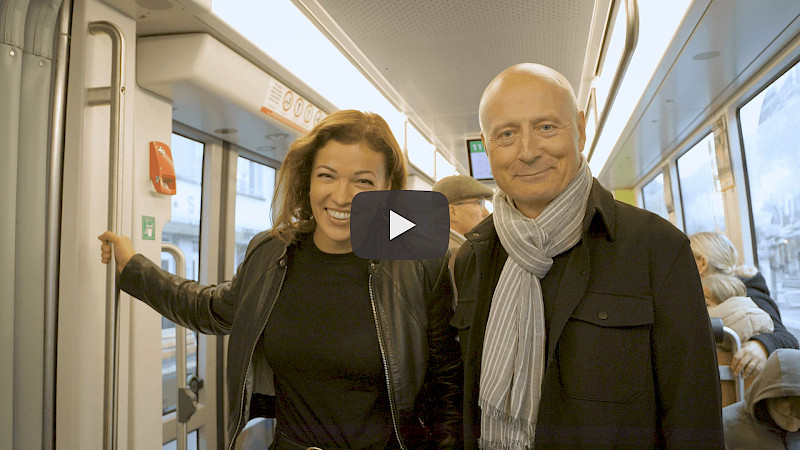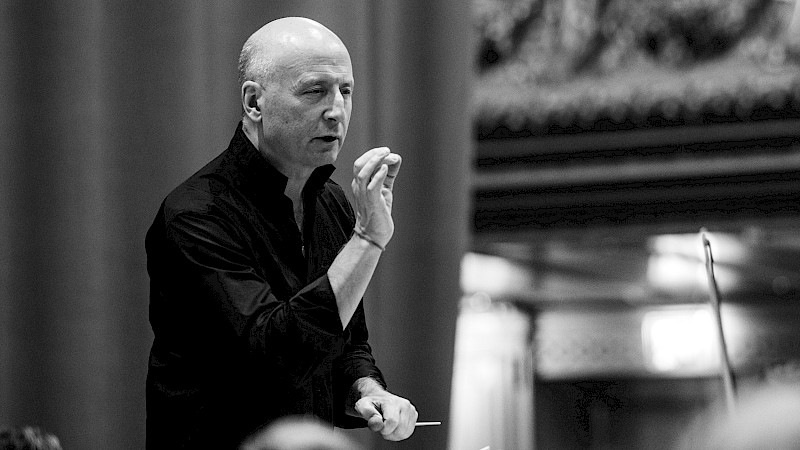
"Someone is running for their life"
Shostakovich's works are currently highly topical again. Also for Paavo Järvi, who has a very special relationship with this music.
Paavo, you are currently conducting a lot of Shostakovich: two symphonies last season, two this season. Why is that?
On the one hand, he is one of the great symphonists of the 20th century; his works are central to an orchestra like ours. On the other hand, this music is very close to me, it speaks to me. I grew up as an Estonian in the former Soviet Union, so I know what these symphonies are about.
What are they about? Can that be formulated?
Shostakovich's music is never absolute music, it tells a story. But what it tells is so dark and dangerous that you can't say it in words, only in sounds. We know, of course, what the reality was that he described in his works. But very few of us experienced it all ourselves - the Stalinist terror, the mass deportations, the shootings, the torture, the rapes. The suppression of the individual and humanity was almost worse. All the psychological pressure, the constant fear of saying the wrong thing and falling out of favour.
It was enough to think something wrong: Shostakovich, for example, had to deliver summaries of his readings.
There was total control. They not only controlled which books someone owned, but also how they understood them. An Orwellian nightmare.
Is it noticeable in the performances which conductors share Shostakovich's experiences?
Yes, Mravinsky, Roshdestvensky, Svetlanov, even my father Neeme Järvi - their interpretations testify to a deep, intuitive understanding of his music. Conversely, you also notice when conductors interpret these works to the best of their knowledge and belief, but clearly have no idea. It's like faith: there's a difference between growing up with it and deciding in favour of it at the age of 50. One is deeply honest, the other is an intellectual decision. Although there are exceptions: Leonard Bernstein, for example, understood these works even though he came from a completely different world - I don't know how he did it.
You got to know Shostakovich as a child. What was he like?
It was only a brief encounter, he came to our summer house in Pärnu in 1973, where we have the festival today. He was already ill back then, paralysed on one side and very quiet, he didn't say much. I remember his thick glasses. He looked exactly like the photos you see of him. I was only 13 years old and didn't understand what this moment meant.
Stalin had been dead for twenty years by then, Shostakovich was rehabilitated and appreciated.
He was considered the greatest. But he still knew: one wrong move and I'm gone. The system dealt skilfully with the cultural elite, people lived well and received commissions. But they could lose everything at any time, even after Stalin's death. So they were all locked up, in one way or another: Those who wanted to survive were not allowed to say anything. And those who said something risked their freedom or even their lives. It's no different today. Recently, the pianist and peace activist Pavel Kushnir went on hunger strike in a Russian prison. They let him die.
Do you remember the first time you were really moved by Shostakovich's music?
I often listened to his music as a child, on records at home or when my father conducted it. I found it exciting, stirring - I only understood the subtext later. For example, in the beginning of Symphony No. 10, which we will be performing soon. This beginning is like waking up in a cellar, it reminds me a little of Beethoven's "Fidelio", of this feeling: where am I, it's so dark here! But it's not just a real darkness, everything is depressing and gloomy. And then somewhere there is a voice of hope, a memory of something. The piece begins like a psychological thriller, it grips you immediately.
This symphony was composed in 1953, shortly after Stalin's death. But you don't hear any relief in it.
It's not as if everything changed overnight after Stalin's death. My mother always told me how everyone cried at the time. They thought the world was coming to an end. Stalin had been the saviour, the great father of the Soviet people who took care of everything. They knew he could do anything, he would have been an engineer or a doctor if he'd had the time. It was an absurd cult of personality - no wonder religion was so frowned upon back then! They didn't want another god, they had Stalin. When you grow up in a society like that, in constant fear and with no outside information, you start to believe what you're told. It was a real brainwashing.
What does that mean for you as a conductor? Do you approach Shostakovich's works differently to others?
I don't do anything special. Of course I have my own view of the music, and of course it has a lot to do with my personal experiences in the Soviet Union. But Shostakovich's symphonies require the same thing as all the others: Experience. You have to perform them many times, try out many things. In the past, I mainly endeavoured to create clear structures. Today I'm looking for something more raw, rougher. Something where the emotional side of a gesture is more important than the technique. Structural clarity remains important, but it's not enough.
How do you convey this view to an orchestra that hasn't had your experience?
We performed Shostakovich's Symphony No. 5 last season and the musicians really felt this music. That's not to be taken for granted, they are all trained to play beautifully. It takes a certain amount of courage to focus more on character than on beauty in these works.
Is it to do with the current war that the understanding of this music is greater than it used to be?
Yes, perhaps. I keep noticing that audiences - and especially younger audiences - react very strongly to Shostakovich's works. In fact, his music is incredibly contemporary today. Everything he wrote about is coming back. The total control, the manipulation of the masses, the disregard for human rights, the aggression: all these things that Stalin was known for are back in a way that we never expected. We thought we would never see tanks crossing borders again.
How is Shostakovich seen in Russia today? Is his music still considered dangerous?
No, he is revered as a great patriotic composer. He is dead, he can no longer clarify anything, they control his image and his myth. Of course, Russian musicians are also aware of the subtext of his works. But they don't talk about it.
Even Shostakovich himself never said everything. Or is his Sixth Symphony, which was recently on the programme, really about "spring, joy, youth", as he claimed?
Whenever Shostakovich said something about his own works, it was camouflage at best. He never really spoke about his music, with good reason. He had to withdraw his Fourth Symphony under pressure from above; it is a dark work, one of his best. Then the fifth - it was not exactly an apology, but an offer, a concession. He no longer dared to write anything that was obviously negative. But he fooled the censors by turning things around in a very clever way. Also in the Sixth: all the depth of this work is in the beginning, in the unusually long slow movement. The scherzo that follows is more of a parody of a scherzo. And then comes the last movement, which is incredibly stirring. It can indeed be understood as triumphant or youthful, but it is not. It's about something else: someone is running for his life to avoid being shot.
Shostakovich was good at hiding and telling stories at the same time.
Yes, there are many allusions in his works - the most famous is the sequence of notes D-Es-C-H, which he used to hide his initials in almost all of his works. He also encoded private feelings; in the Tenth, for example, there is a desperate horn motif in which he immortalised the name of a pupil with whom he was hopelessly in love. Above all, however, he hid many political messages; there are short motifs in many of his works that refer to folk songs, film music or Soviet military songs and thus to very specific content or text fragments. They are only very small hints, melodic cells; a modern audience would not even notice them. But the people who lived in the Soviet Union at the time recognised them immediately.
Do you have to understand these hints when you listen to this music?
No. Music that only survives if you understand the context is not strong enough. You can make up your own stories about these symphonies, which don't have to have anything to do with the Soviet background. They are so well written that they touch you even if you know nothing about them.
We use deepL.com for our translations into English.






